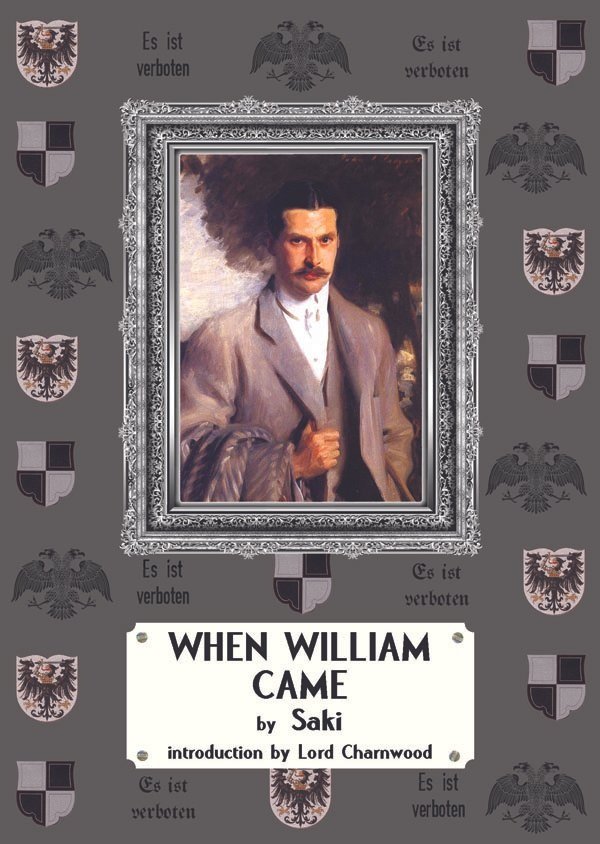 Image 1 of
Image 1 of


When William Came by Saki, introduced by Lord Charnwood
After the death of Edward VII, the feeling of impending conflict was increasing in Britain, and indeed all around Europe. The atmosphere of growing martial expectation made for escalating tension.
Inevitably Saki wondered. What would happen if Britain were attacked and overcome? How might such a thing occur? Who would be the likely invader? Really how ready was Britain for combat?
With new confidence as a novelist, he applied his elan to a seemingly fantastic proposal: suppose the Germans (at that time growing immensely in military power and influence) conducted a lightning-fast attack, catching Britain unawares? And won, hands down, over a sleepily complacent declining power?
Tracing the delayed return of traveller Murrey Yeovil, after near death in Siberia and Finland, to a London profoundly changed under the new regime, and his wife Cicely’s circumspect embrace of the adulterated social scene which ensues the invasion, Saki negotiates a portrait of the British people’s varying responses to the “fait accompli”. Representing one side, Murrey writhes under the new yoke, while on the other Cicely decides that one must be practical and adapt to survive.
Saki’s acid wit is justifiably famous; it is employed here once again. But a new note is introduced alongside the scathing social dagger-thrusts — a sobriety and poignancy which reveal his deeper feeling. Like that of Rupert Brooke, Saki’s attitude to the effeteness which he had previously celebrated changed as the times closed in on war. Though sometimes it reads like a manifesto of personal conservatism, and also a gorgeous satire, When William Came is furthermore a profoundly heartfelt expression of the author’s hope for freedom. It was first published in 1913.
PUBLICATION: January 25, 2025
ISBN: 978-6457519-8-7 paperback
After the death of Edward VII, the feeling of impending conflict was increasing in Britain, and indeed all around Europe. The atmosphere of growing martial expectation made for escalating tension.
Inevitably Saki wondered. What would happen if Britain were attacked and overcome? How might such a thing occur? Who would be the likely invader? Really how ready was Britain for combat?
With new confidence as a novelist, he applied his elan to a seemingly fantastic proposal: suppose the Germans (at that time growing immensely in military power and influence) conducted a lightning-fast attack, catching Britain unawares? And won, hands down, over a sleepily complacent declining power?
Tracing the delayed return of traveller Murrey Yeovil, after near death in Siberia and Finland, to a London profoundly changed under the new regime, and his wife Cicely’s circumspect embrace of the adulterated social scene which ensues the invasion, Saki negotiates a portrait of the British people’s varying responses to the “fait accompli”. Representing one side, Murrey writhes under the new yoke, while on the other Cicely decides that one must be practical and adapt to survive.
Saki’s acid wit is justifiably famous; it is employed here once again. But a new note is introduced alongside the scathing social dagger-thrusts — a sobriety and poignancy which reveal his deeper feeling. Like that of Rupert Brooke, Saki’s attitude to the effeteness which he had previously celebrated changed as the times closed in on war. Though sometimes it reads like a manifesto of personal conservatism, and also a gorgeous satire, When William Came is furthermore a profoundly heartfelt expression of the author’s hope for freedom. It was first published in 1913.
PUBLICATION: January 25, 2025
ISBN: 978-6457519-8-7 paperback
After the death of Edward VII, the feeling of impending conflict was increasing in Britain, and indeed all around Europe. The atmosphere of growing martial expectation made for escalating tension.
Inevitably Saki wondered. What would happen if Britain were attacked and overcome? How might such a thing occur? Who would be the likely invader? Really how ready was Britain for combat?
With new confidence as a novelist, he applied his elan to a seemingly fantastic proposal: suppose the Germans (at that time growing immensely in military power and influence) conducted a lightning-fast attack, catching Britain unawares? And won, hands down, over a sleepily complacent declining power?
Tracing the delayed return of traveller Murrey Yeovil, after near death in Siberia and Finland, to a London profoundly changed under the new regime, and his wife Cicely’s circumspect embrace of the adulterated social scene which ensues the invasion, Saki negotiates a portrait of the British people’s varying responses to the “fait accompli”. Representing one side, Murrey writhes under the new yoke, while on the other Cicely decides that one must be practical and adapt to survive.
Saki’s acid wit is justifiably famous; it is employed here once again. But a new note is introduced alongside the scathing social dagger-thrusts — a sobriety and poignancy which reveal his deeper feeling. Like that of Rupert Brooke, Saki’s attitude to the effeteness which he had previously celebrated changed as the times closed in on war. Though sometimes it reads like a manifesto of personal conservatism, and also a gorgeous satire, When William Came is furthermore a profoundly heartfelt expression of the author’s hope for freedom. It was first published in 1913.
PUBLICATION: January 25, 2025
ISBN: 978-6457519-8-7 paperback